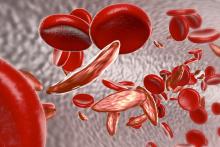Doubling total body irradiation improved rates of engraftment without altering safety in patients with severe hemoglobinopathies undergoing haploidentical hematopoietic cell transplantation, new findings suggest.
“[A]lthough our previous study showed cures in most patients and low toxicity, the graft failure rate – albeit all with full host recovery – was 50%,” Francisco Javier Bolaños-Meade, MD, of Johns Hopkins University, Baltimore, and his colleagues wrote in the Lancet Haematology. The present study set out to decrease graft failure in these patients.
The researchers conducted a single-center study of 17 consecutive patients who underwent haploidentical hematopoietic cell transplantation for a severe hemoglobinopathy. A total of 12 patients had sickle cell disease and 5 had beta-thalassemia major.
Study participants received a nonmyeloablative conditioning regimen consisting of haploidentical related donors and postprocedure cyclophosphamide.
“The primary endpoint of the study was modified to evaluate engraftment by measurement of blood chimerism,” they wrote.
After analysis, Dr. Bolaños-Meade and his colleagues found that increasing total body irradiation dose from 200 cGy to 400 cGy lowered graft failure without raising toxicity. In particular, only one participant had primary graft failure, but experienced recovery of host hematopoiesis.
Of the 17 patients, 13 patients (76%) achieved full donor chimerism and 3 patients (18%) had mixed donor-host chimerism. Three patients remained on immunosuppression, the researchers reported.
With respect to safety, five patients developed acute GVHD, which varied from grade 2 to 4; chronic GVHD was seen in three patients.
“The results of our study warrant further investigation to determine whether the curative potential of allogeneic bone marrow transplantation can extend beyond the traditionally small fraction of patients with severe hemoglobinopathies who have matched donors and are healthy enough to receive myeloablative conditioning,” they wrote.
The study was funded by the National Institutes of Health and the Maryland Stem Cell Research Fund. The researchers reported financial disclosures related to Aduro Biotech, Amgen, Alexion Pharmaceuticals, Celgene, Takeda, and others.
SOURCE: Bolaños-Meade FJ et al. Lancet Haematol. 2019 Mar 13. doi: 10.1016/S2352-3026(19)30031-6.


